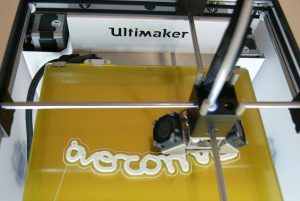A major conference exploring disability and digital fabrication recently took place in the Digital Performance Lab at the University of Salford’s MediaCityUK campus. Over 50 delegates representing service users, technical experts, policy makers and leading charities came together to discuss the potential of digital fabrication to support economic, physical and mental well-being. 
The free one-day conference was organised by the University of Salford, the University of Dundee and Disability Rights UK. It was supported by Ultimaker GB Ltd, a leading manufacturer of 3D printers, with demos and design clinics running all day. The conference was also supported by Shaw Trust, which provided an access fund to help support the needs of delegates. It was the final event of the AHRC-funded ‘In the Making’ project, and the conference heard findings from the project, which has been taking 3D scanners and 3D printers out to the neighbourhoods of Salford and involving the city’s disabled people in the use of this new digital technology. http://www.inthemaking.org.uk/conference/
Principal investigator Dr Ursula Hurley said: “As technologies like 3D printers become more widely available, we are developing the ability to make almost anything we can think of. This is where the imagination becomes important. How do we find new ways of doing new things? What are the possibilities of this technology? How might it change lives for the better? It’s really about ideas, innovation, experimentation, looking at things from different points of view. The ‘In the Making’ project is a wonderful opportunity to see just how creative we can be in developing our understanding of the technology. We’re really looking forward to developing the findings presented at our conference.”
Co-investigator Philip Connolly, the Policy Manager of Disability Rights UK said, “Our charity wants to see disabled people emerge as leaders in the possibilities that this new technology offers. In the workshops we have seen disabled people print finger grips to support them in independent living but in the future it is possible that they will print limbs too. By acquiring these skills we expect disabled people to design solutions that may overcome their own barriers to the labour market but also prototypes of use and commercial value to everyone else too.”
Dr Nick Taylor, from the University of Dundee and project co-investigator said; “The benefits of new technologies like digital fabrication are usually spread unevenly and it’s the people who were already empowered who gain the most. Democratising making is about more than just making the technologies available: it’s about making them engaging, making people aware of the possibilities, and finding ways to help people to realise those possibilities. Through this even we want to share what we’ve learned about how to do this, and hopefully see it picked up by other organisations.”
Roy O’Shaughnessy, Chief Executive of Shaw Trust and Conference Chair, added: “Disability Rights UK and the Universities of Salford and Dundee are leading the way on helping more disabled people to understand the benefits of digital fabrication. Embracing this type of manufacturing process raises the potential for revolutionising how assistive technology is developed in the future. Digital fabrication can overcome some of the cost of existing manufacturing techniques with plastic and offer disabled people the opportunity to design assistive devices to meet their individual needs. This is a really exciting conference and I look forward to discussing how digital fabrication can transform the assistive technology industry and help more disabled people live an independent life.”
For further information, please contact Ursula Hurley: u.k.hurley@salford.ac.uk, 0161 295 2851